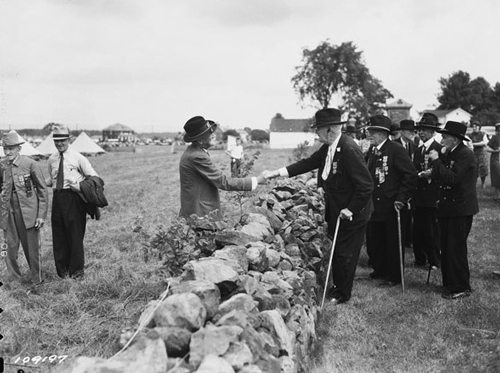
Amid the political, cultural, historical and spiritual turmoil of our moment, many of us find ourselves a bit disoriented. Our longstanding, defining views of institutions and issues may be altered.
An unexpected phenomenon on social media and in real life is a disappointing lack of grace of some on the “winning” side of some controversies. There are a number of people who subtly or not-so-subtly disparage those who are now converting to their long held point of view. They question the motivations of newcomers. They question their judgment. They resemble those pious churchgoers who never let their newer cohorts forget that no matter what, they’ll always be second-class in a sense, unable to achieve the status of those who came earlier.
Such an attitude is understandable, to some extent. It’s may also be accurate, to some extent. Nonetheless, it’s also self-indulgent.
From a leadership perspective, such an attitude is a mistake of the first order.
Honor Converts
The practice of 21st century leadership is more and more about influence. It’s less and less about directing others or presuming to impose points of view. This is true in all settings, from business to politics.
Even the highest positional leaders, such as presidents and popes and ceo’s must focus on persuading others. Much of their power is not directly applied as in the past, but is simply the power to persuade (in Richard Neustadt’s lasting phrase). What sets them apart is a unique vantage point, and the number of tools at their disposal.
If leaders are in the persuasion business, then their stock in trade is winning converts.
One of the most effective ways to win converts is to honor them. In so doing one is advancing and honoring the greater cause one serves.
Effective Leaders Honor Converts
Reflect on any effective leader, past or present. You’ll find that they strive to honor converts. The last thing they would do is diminish their contribution.
This is a notable aspect of the transformative leadership of Abraham Lincoln, Theodore Roosevelt, Franklin Roosevelt, Mahatma Gandhi, Martin Luther King, and Nelson Mandela.
One recalls a rather blunt yet memorable application of this approach by President Lyndon Johnson. As recounted by his former aide, Joseph Califano:
Johnson considered the 1965 Voting Rights Act his most important piece of legislation. During one of his many conversations with Republican Senate Minority Leader Everett Dirksen, whose support Johnson needed to get the bill passed, LBJ appealed to his place in history: “Everett, if you come with me on this bill, a hundred years from now there’ll be only two people they’ll remember from the state of Illinois: Abraham Lincoln and Everett Dirksen.” Johnson also made sure that Dirksen became a drafter of the bill so he would be fully invested in it and would vote to break the filibuster. He did. “You treat Everett Dirksen with the same courtesy and attention to his requests that you accord [Democratic Majority Leader] Mike Mansfield,” he repeatedly told me and other White House aides.
Johnson honored those he would convert. He cared enough about achieving his goals that he would overcome any disagreements or distaste he might have felt toward Dirksen and others prospective converts. He also recognized that changing one’s mind on a matter of great controversy is no small thing. It goes against the psychological inclination to remain consistent with one’s prior history and self-concept. In the case of high positional leaders, it likely requires that they turn their back–or, less charitably, turn their coat–on prior commitments on which others rely. The fact is, to convert by call upon a range of virtues every bit as real as those of first movers.
Johnson’s approach worked. With Dirksen on his side, the tide turned toward passage of the long-stalled Voting Rights Act. He understood that honoring converts would not only encourage others to follow Dirksen’s lead on this vital measure–it would also be a persuasive element in future leadership efforts.
Conversely, not to honor converts can be self-centered or prideful. It’s irrefutable evidence that an individual’s leadership is to that extent less about service than about oneself.
What About You?
Do you honor converts as part of your leadership approach? Or do you succumb to dismissing or diminishing their contribution for not seeing your point of view sooner?
How can you most effectively honor converts? How can you encourage others to change their positions on matters of importance? How can you make it easier for others to walk back from earlier positions and commitments?
The fact is that people convert for any number of reasons. Some may be opportunists. If so, advance your cause by giving them what they regard as an opportunity. Some may hold principles that you find hard to credit or comprehend. Take them on their own terms. In the end, no one can divine others’ motivations. More importantly, good or bad motivation is not the fundamental point: it’s all about advancing the greater cause at hand.
In the digital age of 21st century leadership, the circumstances are being reconfigured. On the one hand, social media make rapid changes in sentiment possible as never before. On the other hand, changing one’s mind has an additional challenge: the Internet may preserve anyone’s prior positions and evolving thinking. How do you take these new factors into account?
Nothing can take away from the daring–even heroism–often exhibited by those who are right first, who break new ground. To celebrate the subsequent service of converts cannot take away from the achievement of the first movers. Rather, honoring converts can extend their achievement, taking it beyond where the pioneers could have gone on their own. In situations of significant change, where a majority or consensus is required, converts are indispensable.
Honor Converts
